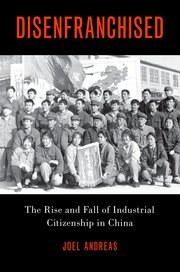Disenfranchised
豆瓣
The Rise and Fall of Industrial Citizenship in China
Joel Andreas
简介
In the decades following World War II, factories in many countries not only provided secure employment and a range of economic entitlements, but also recognized workers as legitimate stakeholders, enabling them to claim rights to participate in decision making and hold factory leaders accountable. In recent decades, as employment has become more precarious, these attributes of industrial citizenship have been eroded and workers have increasingly been reduced to hired hands. As Joel Andreas shows in Disenfranchised, no country has experienced these changes as dramatically as China. Drawing on a decade of field research, including interviews with both factory workers and managers, Andreas traces the changing political status of workers inside Chinese factories from 1949 to the present, carefully analyzing how much power they have actually had to shape their working conditions.
contents
Preface
1. China and the era of industrial citizenship
2. Enfranchised
3. Participatory paternalism
4. Mass supervision
5. Big democracy
6. Revolutionary committees
7. Reforming the work unit system
8. Disenfranchised
9. Lessons and prospects
Appendices
Major events
Chinese terms
Acronyms
Interviewees
Bibliography